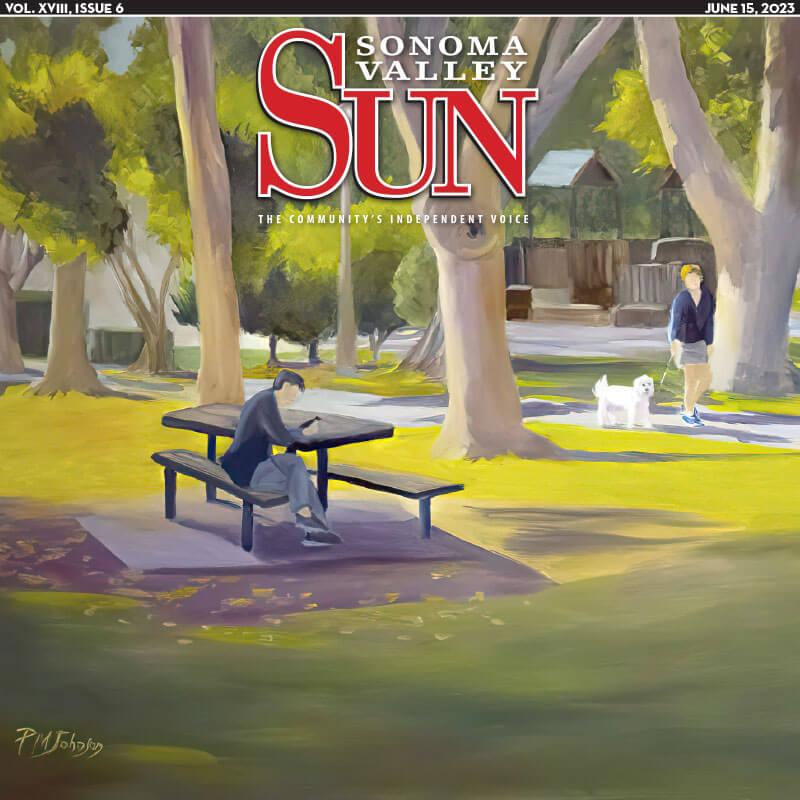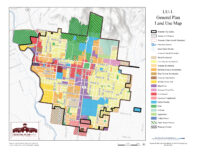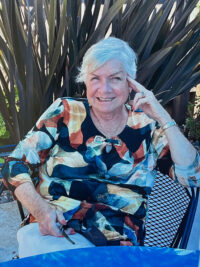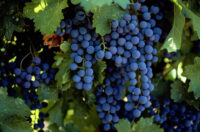By Jonah Raskin —
I recently spent three days in the town of Sonoma, visiting friends and revisiting familiar places like Oak Hill Farm that I wrote about in Field Days, my book about farms, farmers, and field workers. Back in San Francisco, I told a longtime friend that I felt lost in the City. “You’re an exile from Sonoma,” he said. As soon as he said the words I knew they were true. Perhaps he knew me better than I know myself. I’m not surprised that he’d say I was an exile from Sonoma. After all, I lived in Sonoma County for 40 years. I’ve only been in San Francisco for three years. The climate here is different, the culture is different, the topography is different.
A friend picked me up in San Francisco and drove me to Sonoma. As soon as we arrived at the edge of town, I felt like I was at home again and at peace with myself and my surroundings. I realized that there is a lot to be said for the familiar and the recognizable: the early morning chill, the heat at midday, the traffic on Sonoma Highway, the cars parked in Maxwell Village, and the muffins and the coffee at Sweet Pea Cafe on West Napa. My friends arranged for me to stay in a vacant condo near the library that came with a hot tub and a pool. They invited me for supper on a Sunday and served locally raised beef and a green salad made from locally raised lettuces, radishes and onions that had been harvested the previous day.
Produce in San Francisco is never that fresh, even when I buy it at my local grocery, a worker owned and operated coop; it feels good to eat beef from locally raised cows. I spent part of Saturday morning at Oak Hill Farm talking to Arden and Jimmy, and listening to their stories which reconnected me to the land I had grown to love when I worked in the fields, planting, cultivating, and harvesting. No wonder I missed the place. It provided me with a sense of home and a family that I created and that meant more than my own biological family.
I realized perhaps for the first time that exile can be a sad and lonely place. For years I had idealized exile and thought that it was a prerequisite for writing. After all, James Joyce, the Irishman who lived outside of Ireland – his birthplace – for most of his life touted “silence, exile, and cunning.” Joyce had to be away from Ireland to see it, understand it and write about it with detachment and with passion, too. I’m not sure if I will write about Sonoma again. I wrote about it for years, sometimes for the Sonoma Sun, and knew that friends would read what I wrote. There’s a lot to be said for a local audience as well as local produce.
More and more these days, I think that exile is a mental and physical condition that’s shared by many humans who don’t live and work in the places where they were born and raised. As a species we’re in a near constant state of flux. We’re all exiles in one way or another. Some of us are better than others at the art of adaptation. It took me decades to feel at home in Sonoma.
I arrived in the winter of 1975-1976, which was during a drought and wrongly assumed it didn’t rain in Sonoma in winter. Years later, I understood the weather patterns, or thought I did. Drought came back, fires ravaged the landscape, smoke filled the air, and then the land was green again. The weather seasoned me. Working at Oak Hill with Mexicans from Jalisco, who were in exile, provided me with the final chapter in the saga of how I went from feeling like an outsider to a sense that I was local and an insider.
I don’t think I’ll move back to Sonoma. Upheaval disorients me. But I realized that it’s not that far from San Francisco. When I need a Sonoma fix I can find a way to get there and to visit with the likes of Paul Wirtz, who has been feeding Sonomans for decades, and Candi Edmondson whose art has captured the landscape. On my next-to-the-last evening in Sonoma I spoke my own words along with other poets at Bump Cellars on Broadway where I had performed for years. I saw familiar faces in the audience and new faces, too, and forgot that I had up and moved to The City.






I learned the phrase ‘sense of place” from a man named Larry Buell of Petersham, Massachusetts. I have used that therm in my writing about where I live now, and also about other places I have lived, places I understand and cherish. So, what Jonah says here is all about “sense of place.” For him, that place is Sonoma County, and he expresses the feelings with eloquence. I’ve visited Sonoma, and I’ve read Jonah’s book, “Field Days.” I do get it.